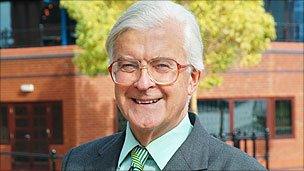Target for 40 university technical colleges
- Published

"We're desperately short of technicians," says Lord Baker
Up to 40 new university technical colleges (UTCs) could open in England, according to Lord Baker, the chair of the trust developing a new type of vocational education for teenagers.
The colleges will develop high-level technical skills for 14 to 19-year-olds, developed in conjunction with employers and universities.
Lessons will run from 8.30am to 5.30pm with five eight-week terms a year.
Colleges will tackle "snobbery" against vocational training, said Lord Baker.
This would be more than three times the number of technical colleges that had been proposed.
"This is an idea whose time has come," said the former education secretary, who now chairs the Baker Dearing Educational Trust and Edge Foundation.
'Snobbery'
Up until now there have been plans to create a network of 12 university technical colleges (UTCs).

Projects such as high-speed trains need a skilled workforce, says Lord Baker
But Lord Baker predicted such a strong demand for UTCs that there will be 15 to 20 colleges by 2012 with the numbers eventually likely to rise to 40.
The colleges are seen as the latest attempt to develop a high-status route for developing technical and craft skills.
Lord Baker accused the last Labour government of "bottling" its attempt to improve vocational education, allowing diploma qualifications to "fall by the wayside".
But he said the modern economy depended on advanced technical skills, and the education system must be able to provide an effective training route.
"We're desperately short of technicians. If we want to have nuclear power station, fast broadband across the country and high-speed trains, we haven't got the technicians to do it. We've got to train the technicians."
Lord Baker said that technical schools in the past "were killed by snobbery".
He said they were associated with "dirty jobs and greasy rags - and everyone wanted to go to a grammar school. It was a huge mistake".
The UTCs will seek to bridge the gap between vocational and academic education, with a curriculum including both technical work-based training and core academic lessons in English and maths.
'Employability'
There will also be vocational specialisms such as engineering, construction, business or medical care.
The colleges will aim to teach "employability" skills, such as helping youngsters to have more confidence in public speaking.
Entry would be at the age of 14, which Lord Baker argues should be the transfer age, rather than 11.
He said switching to a vocational college with a clear work-related purpose would be a way of re-engaging disaffected teenagers.
Colleges would be able to select up to 10% of pupils according to aptitude, and will draw pupils from a wide catchment area.
They will be set up as free-standing academies and - like the government's free schools idea - are likely to be set up in refurbished premises, rather than being newly built.
Lord Baker said the UTCs would not be "pillared halls" - and he gave as an example plans to convert a light manufacturing building in Norwich.
The colleges will receive per pupil funding from government.
'Two tier system'
It's expected they they will gain from the the government's pupil premium scheme, and receive extra money for pupils from poorer families.
Critics say the UTC project will re-create the divisions of the 11-plus, and will narrow pupils' horizons by channelling youngsters away from academic subjects.
And teachers' unions have warned that the project will create a "two-tier" secondary school system, with youngsters making far-reaching decisions about their careers at too early an age.
However Lord Baker has rejected this criticism, saying colleges must be seen as a positive choice. He said the pupil intake will be "self selecting", with teenagers wanting to switch from mainstream secondary schools.
He also emphasised that the UTC brand should maintain its appeal for pupils and their parents.
The involvement of universities, further education colleges and employers will help to maintain standards and relevance to the jobs market, he said.
"We have to keep up the quality - it can't be cheap and cheerful... We mustn't water down the beer."
- Published9 September 2010